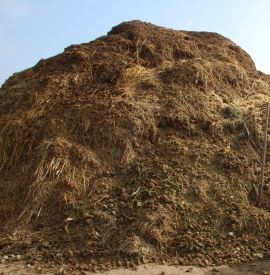What non-gardeners might call a load of crap, we growers refer to as manure, and it’s the life-blood of a healthy garden.
Nutrients in different types of manures can vary wildly, depending of course on the animal itself and its diet, whether it is a caged animal or roams freely, and even the age of the animal and its overall health. The manure itself, if left for too long, will lose a large portion of its nutrients to insects or rainwater. On the other hand, aged manure stinks less and is less likely to “burn” your plants. So, six of one and a half-dozen of the other. To be perfectly safe and avoid the smell, I usually just mix it in with my compost and call it a day.
Here is what you need to know about the various types of manures:
Cattle: Cow manure actually has the lowest concentrations of nutrients, primarily because the cow’s diet consists mostly of grass. But low concentrations actually make it one of the safest manures to use in abundance. Another thing to consider is availability (a lot of it around here) and the ease with which you can simply gather up hardened piles of it. (Am I grossing you out?) But seriously, a quick trip around the pasture with a pickup and a hay-fork and you can gather quite a pile of cow manure.
Horse: Horse manure is a bit more powerful than cow manure, but boy does it contain the weed seeds. Prepare to weed yourself silly if you use it. I have a friend who gives me all the horse manure I want, but it’s a mixed blessing. He piles it up and all I have to do is shovel it into my truck, but months later, when I’m pulling weeds out of everything, I sometimes wish I had gone another route. Be warned.
Poultry: Very high in nitrogen, with a significant amount of potash and some phosphorus. Consider the source on this one, as caged birds are often given antibiotics. Free-range birds are the optimum, but keep in mind that very fresh chicken manure will burn your plants. Let this manure age a few weeks, or mix it in well with your compost before applying.
Sheep: I have not used sheep manure, but I know it is very similar to chicken manure. Same rules apply pertaining to caged or free-range.
Rabbit: Rabbit manure is actually a very prized manure and hard to come by. We just don’t have a lot of rabbit farmers in our area, and they tend to keep their manure. So there.
Bat guano: I would love to get my hands on some of this, but you have to buy it and it’s pricey. I’ve read such terrific things about it. Some say it’s like supercharged chicken manure. (OK, it sounds weird to get excited over manure. Guilty as charged.)
Got any tips you want to share about manure? I’m serious. Do you?
© Wade Kingston

